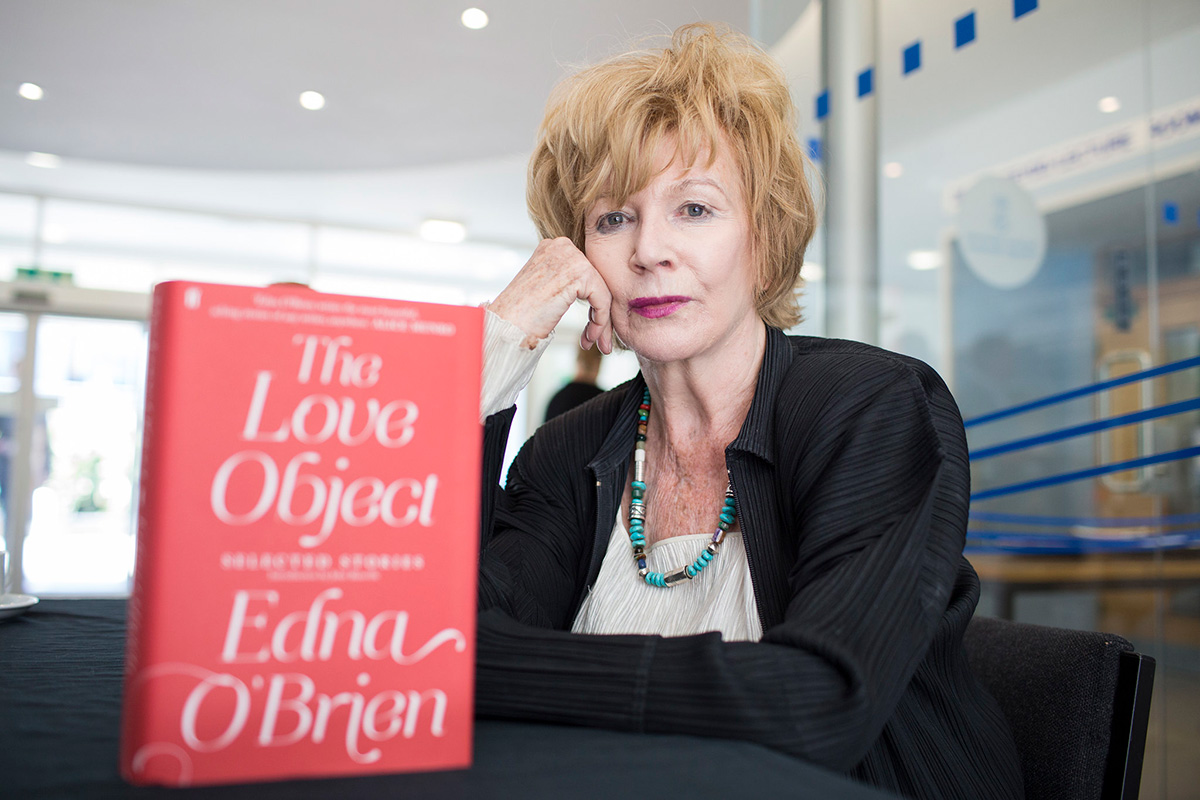Irish Literary Iconoclast
Edna O’Brien (1930-2024)
Novelist Edna O’Brien famously defined her native Ireland as both “a state of mind and an actual country.” The writer, who passed away last Saturday aged 93, long sustained a troubled relationship with Ireland or rather the other way around. She bared the Irish mind to her readers and suffered for it. With courage and aplomb, she dissected and shone a light on social realities and mores ignored and suppressed for generations.
In writing, the young Ms O’Brien found a way to escape the predictable yet fearsome course of her childhood in outwardly charming Tuamgraney, County Clare, next to Lough Derg in Western Ireland which she mercilessly described as ‘fervid and enclosed’.
Here, the family lived at Drewsboro, an imposing two-storey house and one of the few tangibles left of a sizeable inheritance her father had squandered on liquor and dice. Her mother Lena, more sensible but strict and rather unforgiving, had returned home to raise her family after a brief sojourn in New York. Age eleven, Edna was entrusted to the care of the Sisters of Mercy who delivered a ‘suffocating childhood’ that sparked a lifelong rebellion against religion and its stifling norms.
Unwittingly, the nuns at the Convent of Mercy in County Galway made a significant contribution to Ireland’s awakening by stirring rebellion in their charge. Fleeing to Dublin at the earliest opportunity, Ms O’Brien soon drifted into the city’s literary scene, got married, discovered her calling via James Joyce’s A Portrait of the Artist as a Young Man, and promptly penned her debut novel The Country Girls, the first instalment of a trilogy that was later credited with breaking the silence on sexual and social issues plaguing the young republic.
Chaste and Banned
Though chaste by modern standards, the book caused a scandal on its release in 1960 and was promptly banned for its explicit content (and for being ‘a slur on Irish womanhood’) alongside classics such as Catcher in the Rye and Brave New World – both currently included in the required reading lists for secondary school students. Other literary works, amongst them Ulysses by James Joyce were never technically banned but simply not released by their publisher for sale in the republic for fear of being outlawed.
The Country Girls trilogy established Edna O’Brien as a iconoclast whose shrewd satire and lyrical wit was at first lost on pious readers. Her books were duly burned in Tuamgraney where she became persona non grata, accused of shamelessly peddling sauce and smut. The vicious attacks, launched from pulpits and in papers, gave her notoriety, established her name and reputation – and drove her into exile. Settled in the Swinging London of the 1960s, her Chelsea home soon turned into haven of style and experimentation with psychedelic substances.
Her marriage dissolved after ten years. She had eloped with Irish-Czech writer Ernest Gébler but he proved unable to deal with the literary success of his spouse: “You can write and I will never forgive you.” She abruptly walked out one evening in 1966 whilst cooking supper.
A three-year acrimonious custody battle for her two sons ensued. In the end, the court did grant her custody but only after she signed an undertaking to never show the children her 1965 novel August Is a Wicked Month. For years after, Mr Gébler insisted that he was the real author of his ex-wife’s earlier novels.
Mrs O’Brien never remarried and turned to her writing, perfectly in tune with the changing times and the uprooting of convention. However, she managed to keep her feet firmly rooted in the ground and her craft, resisting the lure of stardom and the attended vices.
Broad Canvas
Elegance personified, Mrs O’Brien broadened her canvas after a dry spell lasting from the mid-1970s to the mid-1980s. She travelled the world in search of the creative fervour that had propelled her career. The approach of The Country Girls was applied to Bosnia in The Little Red Chairs and Nigeria in Girls, a harrowing tale of a group of school girls abducted by the religious zealots of Boko Haram. In 2022, she staged the play Joyce’s Women in Dublin to wide acclaim.
Later in life, Mrs O’Brien’s relationship with Ireland improved markedly. It is not that she mellowed but that her native country belatedly joined and embraced modernity. Whilst she admired the word wizardry of the 1980s ‘flash prose’ as offered by Tom Wolfe and Hunter SA Thompson, she never quite expunged feelings from her own writing, preferring the Russian classics instead, perhaps heavier on passion and lighter on description.
Amongst more contemporary writers, Mrs O’Brien displayed a fondness of WG Sebald (1944-2001) whose fascination with ‘displaced’ people touches on her own work (and life); and of Chilean writer Roberto Bolaño (1953-2003) who thought himself a poet but was, by his own admission, forced to “commit to the vulgarity of writing stories” to make ends meet during his exile in Spain. Both WG Sebald and Roberto Bolaño left small oeuvres that gained in appreciation over time. However, her favourite remained, of course, James Joyce with whom she shared an impeccable sense of the cadence and syntax of Irish English.
But, as the critic Nuala O’Faolian, surmised in a 1983 review, Edna O’Brien owed nothing to those who came before her or, indeed, to any literary tradition. She carved her own niche and there displayed for all to see a cast of women who love and suffer.
Edna O’Brien was recognised as a prolific and hard-working author. She left over two dozen novels and short story anthologies, numerous plays, plus a few memoirs, children’s books, several non-fiction books, a poetry collection, and of course biographies of James Joyce (1999) and Lord Byron (Byron in Love).
Josephine Edna O’Brien born on December 15, 1930; died July 27, 2024.
Cover photo: Irish author Edna O’Brien at a book signing in Wales 2013.
© Photo by Literature Wales/James Davies


